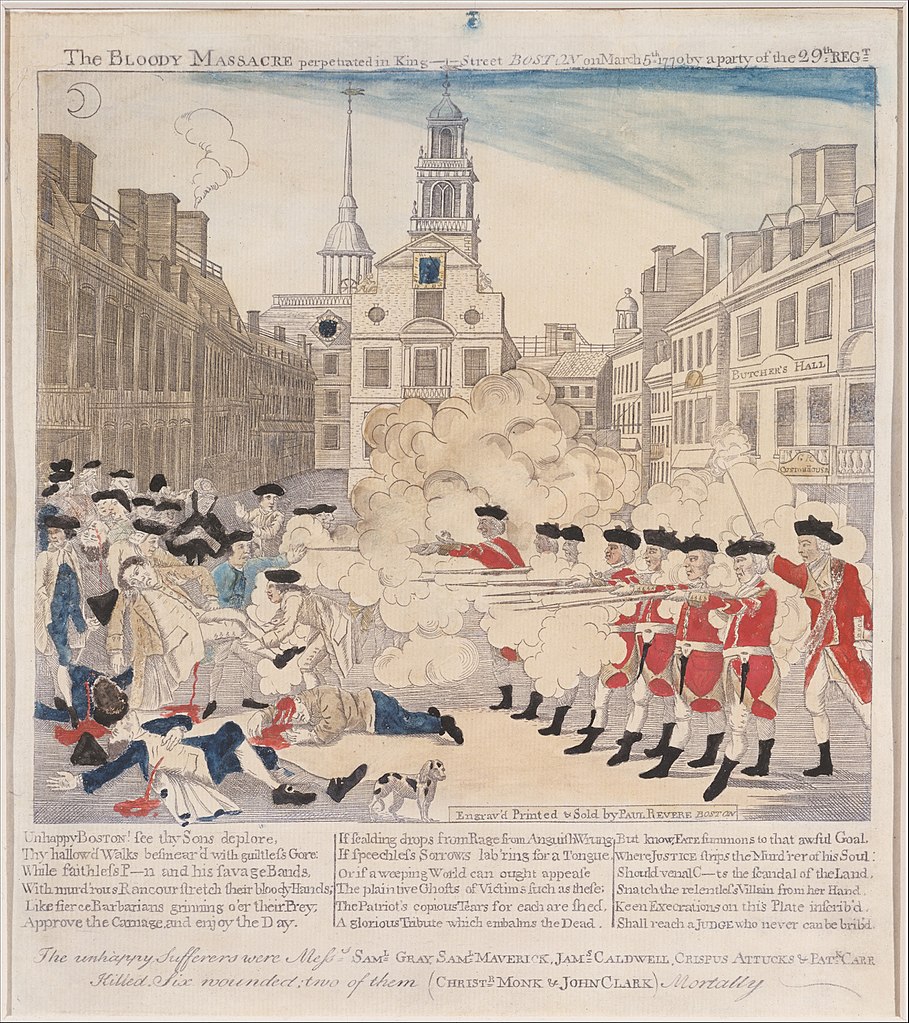WEEK 5
The Boston Massacre was a confrontation in Boston on March 5, 1770, in which nine British soldiers shot several of a crowd of three or four hundred who were harassing them verbally and throwing various projectiles. The event was heavily publicized as "a massacre" by leading Patriots such as Paul Revere and Samuel Adams. British troops had been stationed in the Province of Massachusetts Bay since 1768 in order to support crown-appointed officials and to enforce unpopular Parliamentary legislation. Amid tense relations between the civilians and the soldiers, a mob formed around a British sentry and verbally abused him. He was eventually supported by seven additional soldiers, led by Captain Thomas Preston, who were hit by clubs, stones, and snowballs. Eventually, one soldier fired, prompting the others to fire without an order by Preston. The gunfire instantly killed three people and wounded eight others, two of whom later died of their wounds. Depictions, reports, and propaganda about the event heightened tensions throughout the Thirteen Colonies, notably the colored engraving produced by Paul Revere which you can see below.
David McCullough on John Adams and the British soldiers arrested and accused of murder:
"Samuel Adams was quick to call the killings a 'bloody butchery' and to distribute a print published by Paul Revere vividly portraying the scene as a slaughter of the innocent, an image of British tyranny, the Boston Massacre, that would become fixed in the public mind. The following day thirty-four-year-old John Adams was asked to defend the soldiers and their captain, when they came to trial. No one else would take the case, he was informed. . . .Adams accepted, firm in the belief, as he said, that no man in a free country should be denied the right to counsel and a fair trial, and convinced, on principle, that the case was of utmost importance. As a lawyer, his duty was clear. That he would be hazarding his hard-earned reputation and, in his words, 'incurring a clamor and popular suspicions and prejudices' against him, was obvious, and if some of what he later said on the subject would sound a little self-righteous, he was also being entirely honest. Only the year before, in 1769, Adams had defended four American sailors charged with killing a British naval officer who had boarded their ship with a press gang to grab them for the British navy. The sailors were acquitted on grounds of acting in self-defense, but public opinion had been vehement against the heinous practice of impressment. Adams had been in step with the popular outrage, exactly as he was out of step now. He worried for Abigail, who was pregnant again, and feared he was risking his family’s safety as well as his own, such was the state of emotions in Boston."
McCullough, David. John Adams . Simon & Schuster.
John Adams willingness to defend these British soldiers was one of the most courageous acts of his lifetime, and although at the time of the trial Bostonians ranted and raged against him, later when the trial was over and temperatures cooled down, it became clear to the larger public that Adams was an extraordinarily brave and wise man. The trial and the acquittal set Adams apart from other Bostonian leaders.
REQUIRED READING FOR THE WHOLE YEAR OF HISTORY OF THE USA

